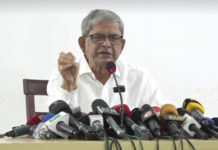Embezzlement of relief is nothing new. There was a fear of pilferage as well as a way to curb it. Although there was no Anti-Corruption Commission, there was a bureau of anti-corruption. The bureau brought many under the law on charges of relief embezzlement. After the establishment of ACC, the legal structures have been strengthened, but their activities did not come up to our expectations. The government has taken various steps to support the people affected by coronavirus.
However, a section of people are out to thwart the government initiative. Many of them are public representatives at the grassroots level. Sacks of relief rice and edible oil are being recovered from their houses.
Relief activities have started due to the coronavirus outbreak. The government has a big plan. Cash will be sent through bank accounts. Local representatives will make the list of the deserving recipients. It is announced that 5 million ration cards will be given to helpless families. They will get food assistance at a nominal price through these cards. The list will be made at the local level as in the past. It cannot be claimed there was no deviation then. Allegations were raised that money was paid to be included in the list. It will only be natural to think that the ruling party men will consider this while making the list.
The local administration usually remains at the helm of distributing relief. But the role of local representatives is important in making the list of beneficiaries and distribution of relief at the grassroots level. If they cannot rein in their greed during the national disaster, the government’s purpose will fail. Institutional capacity will be questioned. Public representatives involved in corruption are not above the law.
Assigned officials are supposed to monitor their activities. But the question is why the public representatives are so reckless, and what is the role of the concerned officials? These matters should be taken into the consideration. If the matter is not handled at the beginning, it may go out of control. The government warned that none will be spared.
It should be investigated as to why the allegations against some public representatives were raised soon after starting the relief distribution. There may be various reasons. Many think this crisis has deepened due to the politicisation of the local government. Earlier, the local government election was non-partisan. After the current ruling party came to power in 2009, the election to union parishad chairman from all levels was launched on party symbol. The local government organisations would become social institutions if the elections to lower tiers of the local government organisations were held neutrally, except for city corporations and zila parishads.
People from all parties and opinions would participate in it. Elected representatives would conduct activities out of their respective party identities. The elections would be more participatory and above controversy.
Those who hampered relief distribution and embezzled relief, can be booked under the ACC act. They should act. Such criminal offences should be investigated speedily and trials be held. The head of the government has talked about zero tolerance against the irregularities in relief. We want to have confidence in this statement. The corrupt public representatives have to be brought to book.
Ali Imam Majumdar is a former cabinet secretary.
This piece, originally published in Prothom Alo print edition has been rewritten in English by Rabiul Islam.









